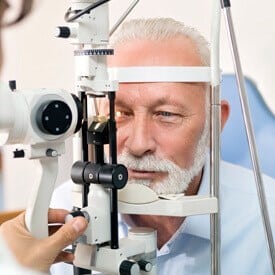Laser Peripheral Iridotomy in Napa, CA
What Is a Laser Peripheral Iridotomy?
When the human eye is healthy and functioning well, aqueous ocular fluid moves between the iris and the lens and filters through the trabecular network where the iris and cornea meet. A disruption in this process can create a buildup of fluid, which increases eye pressure, also known as intraocular pressure. This condition is called glaucoma, and if left untreated, it can cause damage to the optic nerve and lead to permanent vision loss. At Precision Surgery Center of Napa Valley, our ophthalmologists can perform a procedure known as a laser peripheral iridotomy (LPI), which creates a hole in the outer edge of the iris where fluid can escape and drain. This procedure effectively treats acute-angle closure glaucoma and narrow-angle closure glaucoma. If either of these conditions is a threat to your vision, schedule a consultation with one of our ophthalmologists at our practice and find out if a laser peripheral iridotomy in Napa, CA, can help your vision health.
What Are the Benefits of Laser Peripheral Iridotomy?
Laser peripheral iridotomy is a low-risk procedure that can prevent intraocular pressure and lower your risk of developing the conditions above. In glaucoma cases, there is a 66 – 75% chance of preventing the condition if it is caught in the early stages. If it is not caught early, laser peripheral iridotomy can help slow or stop the disease from progressing. At Precision Surgery Center of Napa Valley, laser peripheral iridotomy can be used to help treat various eye conditions. Some of these conditions can include:
- Glaucoma: An overarching term used to describe any condition that could harm the optic nerve. Most conditions harm the nerve by having abnormally high pressure in the eyes.
- Primary Angle Closure (PAC): PAC develops when the eye does not drain properly due to the narrow anatomy of the eye. This blocks the drainage passageway, allowing fluid to accumulate and pressure to increase on the inside of the eye. There are two types of PAC, acute PAC and chronic PAC. Both types of PAC can cause damage to the optic nerve leading to partial or complete vision loss.
- Acute Angle Closure Glaucoma: This is a serious vision emergency. If you have PAC, you could be at risk of an acute angle closure episode. This is when your iris dilates. It causes pressure to slowly build in your eye due to the drainage passageway being blocked. This will eventually cause your iris to push forward, putting a great deal of pressure on your cornea and causing partial or complete vision loss. An acute angle closure episode can cause permanent damage to the optic nerve. This is an extremely painful episode that can affect one or both of the eyes.
Who are the candidates for A laser peripheral iridotomy?
The laser peripheral iridotomy in Napa, CA, may be recommended for patients with acute angle-closure glaucoma and narrow-angle closure glaucoma. In some patients with normal eye pressure and no optic nerve damage, the laser peripheral iridotomy may be recommended as a preventative treatment if the patient has a closed-angle. Patients with more severe, more advanced glaucoma who have undergone another laser glaucoma surgery may not be good candidates for the laser peripheral iridotomy. If you are diagnosed with glaucoma, our board-certified ophthalmologists in Napa, CA, can discuss all your treatment options with you, including LPI.
How Does aN LPI Work?
At our state-of-the-art center in Napa, CA, this procedure is performed within only a few minutes on an outpatient basis. Our ophthalmologists will position you in front of the laser and use numbing eye drops before proceeding so that you feel little to no discomfort. Once you are ready, our ophthalmologist will use the laser to create an incision in the iris. As recovery time following an LPI is very short, you will be able to return to your normal activities almost immediately after your procedure. Your ophthalmologist will closely monitor your healing progress and your intraocular pressure during your follow-up appointments.
What Should I Expect After My Treatment?
The recovery process for your laser peripheral iridotomy treatment is fairly simple. Once the treatment is complete, your ophthalmologist will check your eye pressure. They may also prescribe eye drops to alleviate any soreness or swelling that you may experience inside your eye. For the first few days after your treatment, you may experience red, itchy eyes that are sensitive to light. This is temporary and can typically be relieved with the eye drops that were prescribed to you. Your ophthalmologist will likely have you come in for a few follow-up appointments to monitor your eye pressure. Please don’t hesitate to consult our team if you have any questions or concerns about the recovery process.
Laser Peripheral Iridotomy FAQ
Does a laser peripheral iridotomy hurt?
You will be administered numbing eye drops prior to your procedure so that you experience minimal discomfort. Most patients report a slight stinging or foreign body sensation in the eye after the procedure, which should go away fairly quickly.
Can I drive after my laser peripheral iridotomy procedure?
No, you should not drive for 24 hours after your procedure. We strongly recommend bringing a trusted family member or friend with you so they can safely transport you home.
Will I need to have the laser peripheral iridotomy repeated?
For the majority of patients, the laser peripheral iridotomy will only be performed for them once. If your eye pressure continues to rise following your procedure, then our team will discuss your different options with you.
Advanced Laser Glaucoma Treatment
Glaucoma is the number one cause of vision loss in people 60 years of age and older. If this condition threatens your vision health, know that the ophthalmologists at Precision Surgery Center of Napa Valley are leading experts in treating this condition and performing sight-saving surgeries. To learn more about laser peripheral iridotomy and other glaucoma treatments, contact our surgery center in Napa, CA, and speak with one of our expert ophthalmologists.
*Individual results are not guaranteed and may vary from person to person. Images may contain models.

